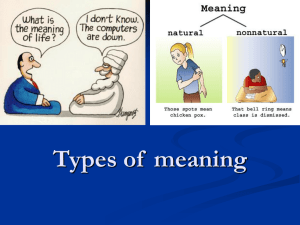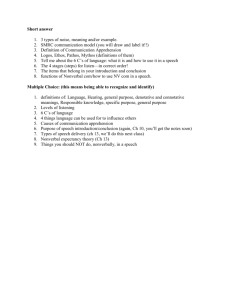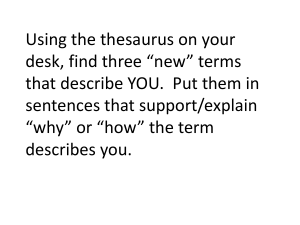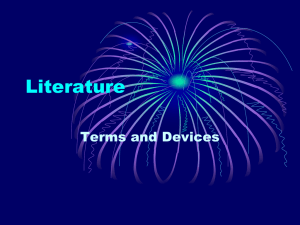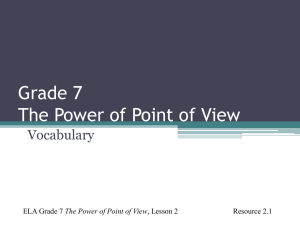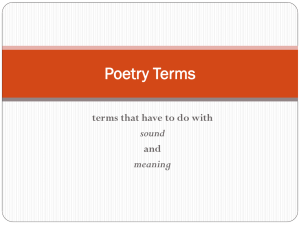Language
advertisement
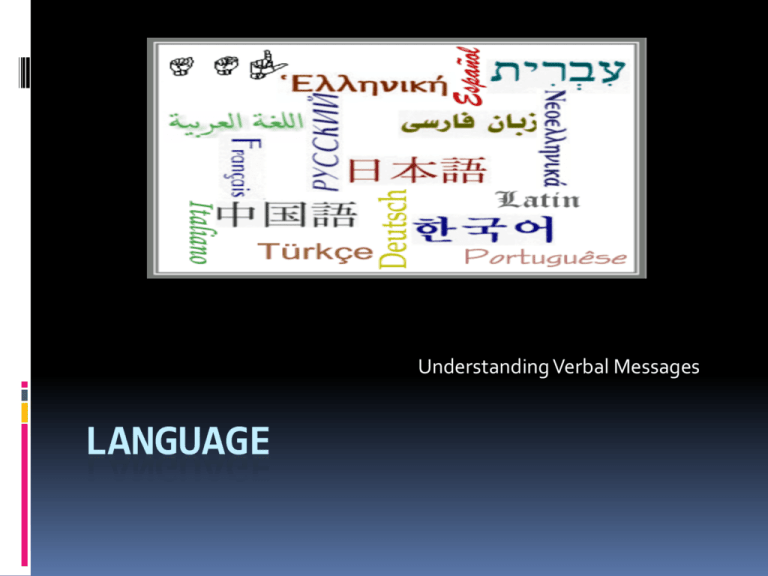
Understanding Verbal Messages LANGUAGE Lesson Objectives 1. Slanguage when to use & when to avoid 2. Basics of language 3. Language bias 4. Language effects on relationships SLANGuage Text, email, chat SHORTHAND Often follows classic shorthand (elimination of vowels) Sometimes replaces letters with numbers Gd new m8 = good new mate OR use of 2=to, too, two OR use of 4=for Often eliminates official words b = be r=are u=you ur=your & you’re Sometimes uses now accepted phrase initials: Lol= lots of laughs or laugh out loud; a/s/l = age/sex/location; ttyl=talk to you later SLANGuage guidelines Do NOT use this type of short hand on: Professional documents Legal documents Educational documents (from grade school on up through College, University, &/or graduate school) It is all right to use with peers & friends Still be careful of generational/regional differences in use ha ha vs. ja ja Language basics terminology: Sign Symbol Denotative Connotative Bypassing Concrete meaning Abstract meaning Neologism Trigger Words Code Switching Sign verses Symbol SIGN = something that is NAUTRALLY associated with something else Smoke Fire SYMBOL = human made representations of things Letters forming words that have been agreed upon to represent something C A T = cat = furry, tailed, meowing mammal Denotative & Connotative Meanings Denotative Meaning = the formal definition that can be found in any dictionary or a word; the literal definition of a word Connotative Meaning = the subjective definition of a word; the personal meaning of a word Denotative v. Connotative Cool Cool Stoned Stoned Sick Sick Connotative Meaning: a closer look Handsome adjective for attractive synonymous with beautiful Not denotatively gender specific Often used exclusively for describing the male gender in U.S.A. People often have personal examples of words that they have singular associations with Subjective responses to words that associate memories and emotion into the meaning of the word Bypassing When communicators have different perceptions of the meaning of a word used causing misunderstanding/miscommunication Concrete & Abstract Meaning Sight Sound Taste Scent Touch CONCRETE Meaning = brings to mind the the word being used in terms of one of the five senses ABSTRAC T Meaning = describing that which cannot be perceived with the five senses Love, freedom, peace, anger, happiness, sadness Neologism When words are invented and catch on above the slang level, but not within dictionaries Reaganomics– coined for Ronald Reagan’s economic approach Normalcy—coined in politics as the state of being normal Obamu—coined for Obama to describe others breaking the glass ceiling Metrosexual—coined for men that dress and groom well but are heterosexual avoiding deliberate neologism invention can help side-step confusion Trigger Word A form of language that arouses an emotional response Words Sounds Nonverbals Curse words Slang Dismissive words “Whatever” “sure” “if you say so” “uh huh” “okay then” et cetera Code Switching Ability to seamlessly change back and forth to different languages/dialects/accents as necessary based on those within a conversation In front of parents, professors, religious institutions, and children formal, polite language In front of peers and alone slang, expletives, in-group language Native language with fellow people and English elsewhere Bias Polarization= when language in used to describe things in extremes suggesting there is nothing in between Allness= often false generalizations that uses language in a way that does not allow for variations Prejudicially Exclusive language Sexism Racism Homophobia Language & relationships Language can help begin, develop, escalate, and/or end relationships Use Empathy = anticipate others reactions and feel as another does to best of one’s ability Language & Relationships 1. Description v Evaluation 1. Describe own feelings instead of judging others’ behaviors/statements/feelings 2. Help v Control 1. Aid with problem solving instead of controlling them 3. Genuine v selfish 1. Communicate sincerely instead of only to serve one’s own needs/wants 4. Equality v Superiority 5. Leave the past in the past Lesson Review 1. Slanguage for friends not profession or education 2. Basics of language & the implications of differing subjective definitions 3. Language bias avoid bias because of the strong power of words 4. Language effects on relationships how to form, maintain, escalate, or terminate links to others
